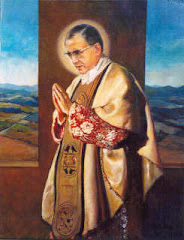Inspiring words from St Josemaría Escrivá:
The supreme power of the Roman Pontiff and his infallibility, when he speaks ex cathedra, are not human inventions. They are based on the explicit foundational will of Christ. How foolish it is, then, to confront the government of the Pope with that of the bishops, or to reduce the validity of the pontifical Magisterium to the consent of the faithful! Nothing is more foreign to it than a balance of powers; human moulds of thought do not help us, no matter how attractive or functional they may be. No one in the Church enjoys absolute power by himself, as man. In the Church there is no leader other than Christ. And Christ constituted a vicar of his — the Roman Pontiff — for his wayfaring spouse on earth.
The Church is apostolic by constitution. That which truly is and is called catholic, should stand out at one and the same time by the prerogatives of unity, holiness and apostolic succession. In that way, the Church is one, with a clear and perfect unity of the whole world and all nations, with that unity of which the principle, root and indefectible origin is the supreme authority and most excellent primacy of blessed Peter, prince of the Apostles, and his successors in the Roman See. And there is no other Catholic Church, but that one which, built on the one Peter, rises up on the unity of the faith and on charity in one unique body, joined together and compact.
We help to make that apostolic continuity more evident in the eyes of all men by demonstrating with exquisite fidelity our union with the Pope, which is union with Peter. Love for the Roman Pontiff must be in us a delightful passion, for in him we see Christ. If we deal with the Lord in prayer, we will go forward with a clear gaze that will permit us to perceive the action of the Holy Spirit, even in the face of events we do not understand or which produce sighs or sorrow.
St Josemaría Escrivá, In Love with the Church, Loyalty to the Church, no.13
Daily Rome Shot 1550
4 hours ago





